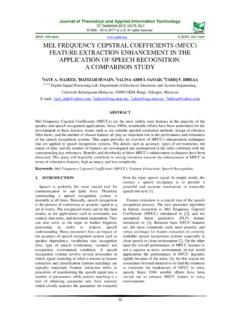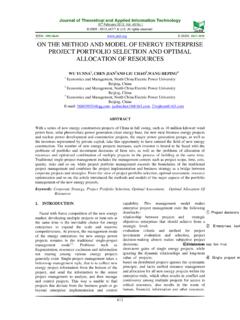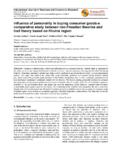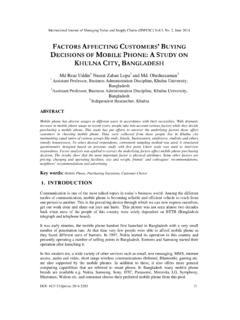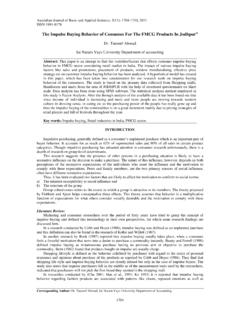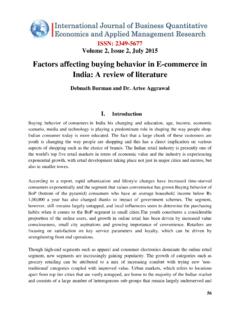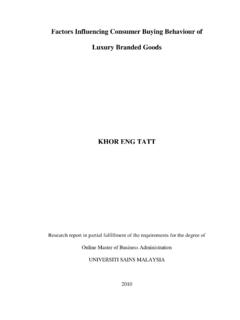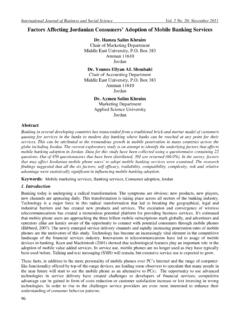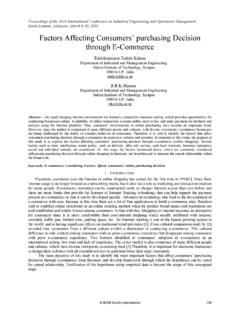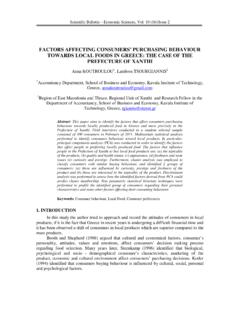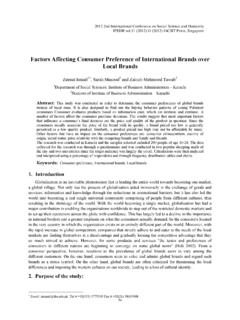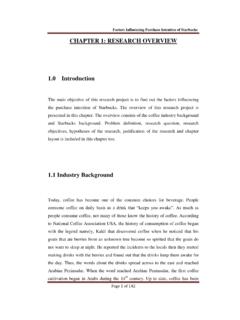Transcription of FACTORS AFFECTING CUSTOMER LOYALTY IN BUSINESS E …
1 Journal of Theoretical and Applied Information Technology 30th June 2015. 2005 - 2015 JATIT & LLS. All rights reserved. ISSN: 1992-8645 E-ISSN: 1817-3195 386 FACTORS AFFECTING CUSTOMER LOYALTY IN BUSINESS E-COMMERCE: A CASE OF INDONESIA 1 TOGAR ALAM NAPITUPULU, 2 HENDRA CIPTA ADITOMO 1 Lecturer, Graduate School, Bina Nusantara University, Indonesia 2 Former Graduate Student in Management Information Systems, Bina Nusantara University, Indonesia E-mail.
2 2hendra_c_aditomo ABSTRACT The purpose of this research is to determine the FACTORS that are first, significantly influence CUSTOMER satisfaction and secondly, whether CUSTOMER satisfaction affects CUSTOMER LOYALTY including the magnitude of the influence, in e-commerce BUSINESS . Several FACTORS such as perceived usefulness, perceived ease of use, CUSTOMER risk perception, CUSTOMER support, CUSTOMER trust, promotion, information quality, transaction security, and brand image of e-commerce that influence satisfaction while buying from e-commerce sites were analyzed.
3 FACTORS such as those mentioned above, which are commonly considered influencing CUSTOMER satisfaction and CUSTOMER LOYALTY through online shopping in other countries were hypothesized to be true in the case of Indonesia. Data obtained by using questionnaire that was distributed to random customers who ever purchased through e-commerce in Jakarta. The method uses Confirmatory Factor Analysis for the measurement model and Multiple Linear Regression analysis to test the structure of the relationship.
4 The results show FACTORS that affect CUSTOMER satisfaction are: Perceived Usefulness, transactions security, Brand Image of E-Commerce, Information Quality, CUSTOMER Support, CUSTOMER Trust, and Promotion. Furthermore, CUSTOMER satisfaction has significant impact on CUSTOMER LOYALTY . Keywords: E-commerce; FACTORS ; CUSTOMER Satisfaction; CUSTOMER LOYALTY ; Regression; Confirmatory Factor Analysis 1. INTRODUCTION In Indonesia, the BUSINESS e-commerce is growing rapidly. The development of e-commerce BUSINESS bring a variety of effects, one of which is the competition among BUSINESS e-commerce becomes more stringent.
5 Therefore, it is essential for companies to retain CUSTOMER LOYALTY so that the company can continue to survive and thrive. CUSTOMER satisfaction is one of the strengths of e-commerce company in order to maintain CUSTOMER LOYALTY (Gong-min, 2010). Currently in Indonesia there are also many BUSINESS models of e-commerce portal that focuses on providers to sell online such as berniaga, OLX, rakuten, lazada, Blibli, Tokopedia, and so forth. This BUSINESS model became popular because people have interests to sell either used items and goods that are still new using e-commerce.
6 However, until now there are many obstacles that make BUSINESS e-commerce in Indonesia still lagging behind compared to other countries in Asia. There are various limitations such as limited speed internet connection in Indonesia, then consumers are still many who do not trust the security of online transactions, as well as the delivered goods do not appropriate in the picture on the website or damaged (Panji, 2014). Seeing these limitations and research on e-commerce portal in Indonesia is still few, then the authors would like to examine the FACTORS that can affect CUSTOMER satisfaction in e-commerce shopping portals in Indonesia.
7 The author also wants to know the significant level of the effect of CUSTOMER satisfaction on CUSTOMER LOYALTY in e-commerce portal in Indonesia. The research conducted consumers who purchased goods or services online using the e-commerce portal and live in Jakarta. Journal of Theoretical and Applied Information Technology 30th June 2015. 2005 - 2015 JATIT & LLS. All rights reserved. ISSN: 1992-8645 E-ISSN: 1817-3195 387 2.
8 LITERATURE REVIEW Electronic commerce (e-commerce) is the buying and selling, and marketing and servicing of products, services, and information through a variety of computer networks. Many companies are now involved in or sponsoring three basic categories of e-commerce: e-commerce BUSINESS -to-consumer, BUSINESS -to- BUSINESS , and consumer-to-consume (O'Brien & Maracas, 2006). Electronic commerce is a concept of sales and purchases made with the help of the Internet (Chaffey, 2007).
9 But the scope of e-commerce not only include financial transactions but also non-financial transactions such as CUSTOMER demands for further information (Kalakota & Whinston, 1997). Organizations that use e-commerce has potential access to customers in all parts as long as the customers connected into internet (Aguah & Tucci, 2003). BUSINESS to Consumer E-Commerce has the following characteristics: Open to the public, where information is distributed to the public. Services are granted general with a mechanism that can be used by public.
10 For example, because the system is in general use, the Web service is provided by using a base web. Services are provided upon request (on demand). Consumer and producer initiative must be ready to respond in accordance with the request. Approach the client / server is often used where taken assumptions client (consumer) using minimal system (Web-based) and processing ( BUSINESS procedure) is placed on the server side. BUSINESS to Consumer e-commerce has a different problem.


